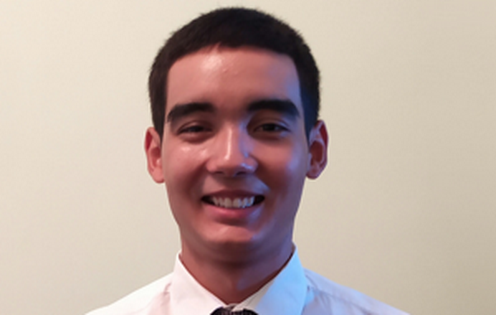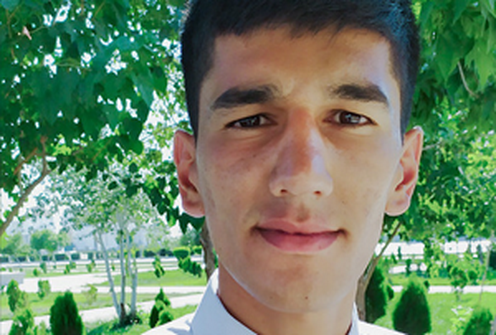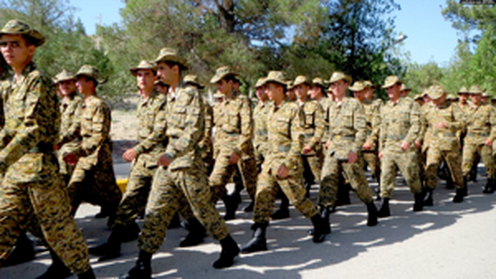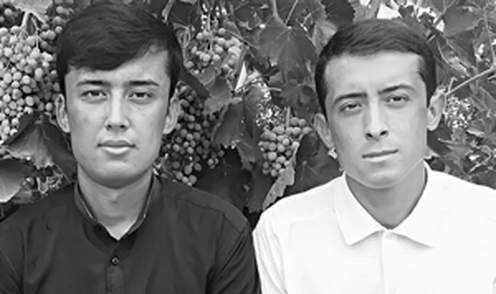A court in Lebap Region jailed 20-year-old Jehovah's Witness conscientious objector Nazar Alliyev for one year for refusing compulsory military service. He is the seventh to be jailed in 2021 so far and joins 14 other jailed conscientious objectors (9 of them serving second sentences). «We deeply regret the criminalization of conscientious objection,» four UN human rights Special Procedures wrote to the Turkmen government in December 2020, adding that Turkmenistan «must provide meaningful alternative service». The regime has not responded to the UN.
On 10 February, a court in the eastern Lebap Region jailed 20-year-old Jehovah's Witness conscientious objector Nazar Alliyev for one year for refusing compulsory military service. He is the seventh conscientious objector known to have been jailed so far in 2021. All had offered to perform an alternative civilian service, but Turkmenistan does not offer this. Turkmenistan has rejected repeated United Nations calls to introduce such a service.
Courts jailed six Jehovah's Witness conscientious objectors in January, five of them within the space of two days. As all six had already served earlier sentences on the same charges, courts handed all of them a two-year jail term, five of them in a strict-regime labour camp (see below).
The jailing of Alliyev brings to 15 the number of young conscientious objectors to military service known to have been convicted and to be currently serving jail sentences (see full list below).
This new case brings to 31 the number of known convictions and jailings of conscientious objectors since Turkmenistan resumed such jailings in January 2018. All of them are Jehovah's Witnesses.
An increasing number of conscientious objectors to military service are serving second sentences for the same «crime». Nine of the current 15 known conscientious objector prisoners – including all six sentenced in January — are serving second sentences (see below).
Six Jehovah's Witness conscientious objectors were freed from Seydi Labour Camp in 2020 after serving their sentences in full.
An aide to the chief specialist Nasrullah ibn Ibadullah at the regime's Commission for Work with Religious Organisations and Expert Analysis of Resources Containing Religious Information, Published and Printed Production told Forum 18 on 12 February that he was not in the office and that his mobile phone was not working. Asked about the jailings of conscientious objectors, the aide said he was not informed and put the phone down (see below).
The telephones of Yusupgeldi Durdiyev, the Cabinet of Ministers official who chairs the regime's Commission controlling religious communities; of the office of the regime-appointed Human Rights Ombudsperson Yazdursun Gurbannazarova; and of Yusupguly Eshshayev, the regime-appointed Chair of the Mejlis (Parliament) Human Rights Committee, went unanswered each time Forum 18 called on 12 February (see below).
Jehovah's Witnesses are conscientious objectors to military service and do not undertake any kind of activity supporting any country's military. But they are willing to undertake an alternative, totally civilian form of service, as is the right of all conscientious objectors to military service under international human rights law.
Turkmenistan has ignored repeated international calls, for example by the United Nations (UN) Human Rights Committee, to introduce a genuine civilian alternative to compulsory military service, to stop prosecuting and punishing conscientious objectors, and to compensate those it has punished.
The UN Human Rights Committee has published 13 Decisions in favour of 15 conscientious objectors from Turkmenistan, all of them Jehovah's Witnesses. In its most recent such Decision, published on 17 September 2019 (C/126/D/2302/2013), it ruled that the right to freedom of religion or belief of former conscientious objectors Juma Nazarov, Yadgarbek Sharipov, and Atamurad Suvhanov had been violated by their jailing (see below).
On 10 December 2020, four UN human rights Special Procedures wrote to Turkmenistan's government expressing «serious concern» about the second sentences handed down in August 2020 to two of the conscientious objectors, Sanjarbek and Eldor Saburov. «We deeply regret the criminalization of conscientious objection,» they wrote, adding that Turkmenistan «must provide meaningful alternative service». The regime does not appear to have responded within the requested 60 days (see below).
Asked why the regime is not willing to introduce a civilian alternative service in line with repeated UN recommendations, and why young men continue to be imprisoned, an official of the Foreign Ministry's International Organisations Department told Forum 18 in August 2020 that Turkmenistan «is dealing with these bodies, including the UN». He said he did not agree that Turkmenistan was failing to implement UN human rights recommendations (see below).
Another Jehovah's Witness conscientious objector former prisoner, Arslan Begenchov, lodged a case to the UN Human Rights Committee in 2018 and is awaiting a decision (see below).
Jehovah's Witnesses filed a complaint with the UN Working Group on Arbitrary Detention in May 2020 on behalf of 19 current or former jailed conscientious objectors. The 19 men include some of those currently imprisoned in Seydi Labour Camp, plus others who have been released after serving earlier sentences.
Other prisoners of conscience jailed for exercising the right to freedom of religion or belief – all of them Muslims – are serving far longer jail terms (see below).
The regime admitted to the UN Human Rights Committee in March 2020 that two jailed Muslims – both in their mid-thirties — had died in prison in 2016. It claimed that they had both died of a «chronic illness» (see below).
Latest prosecution
Hojambaz District Military Conscription Office in the eastern Lebap Region summoned Jehovah's Witness conscientious objector Nazar Alliyev (born 12 December 2000) in autumn 2019. However, as he was living in another city he decided not to go, Jehovah's Witnesses told Forum 18. Conscription officers stepped up their search for Alliyev in April 2020, visiting his mother, workplace and neighbours.
On 16 May 2020, when Alliyev was visiting his mother, several conscription officers took him by force to Lebap Region Military Conscription Office. There officers tried to get him to put on a military uniform, but he refused. Alliyev filed a statement refusing military service. He also mentioned that in 2015 he had been diagnosed with a heart disease, myocarditis and mitral valve prolapse (grade 1). The officer threatened to send him to the army by force.
After that, officers took him to the city Military Conscription Office, where they held him for one night. They told him that the court hearing against him was scheduled for 19 May 2020. However, no court hearing took place. Instead officers took him to the hospital for electrocardiogram and rheumatism tests. He was stated fit for military service.
Alliyev filed an application stating that he would not come to be sent off to the military unit. In addition, under great pressure, his mother signed the application, that she agreed for a criminal case to be initiated against her son. Officers confiscated Alliyev's passport.
Hojambaz District Military Conscription Office wrote to Alliyev stating that no alternative service is available in Turkmenistan. In June 2020 Alliyev filed another statement refusing military service and explaining his religious objections to undertaking military service.
In December 2020, the Prosecutor's Office several times summoned Alliyev, along with his mother. There he wrote a statement explaining his position. Alliyev underwent another medical examination in the district and regional conscription offices. He filed written statements and an application to the Prosecutor's Office.
The investigator summoned Alliyev for interrogation on 4 January 2021, telling him a case was being opened against him under Criminal Code Article 219, Part 1. This punishes refusal to serve in the armed forces in peacetime with a maximum penalty of two years' imprisonment or two years' corrective labour. The indictment was completed on 26 January. Alliyev had to sign a pledge not to leave the area in the run-up to his trial.
One-year jail term
In the run-up to his trial, Alliyev rejected the free lawyer assigned by the state. He chose his own lawyer, who agreed to cite United Nations Human Rights Committee decisions regarding military service in Turkmenistan. These had found that the authorities had violated the rights of conscientious objectors by punishing them for refusing military service (see below).
At Alliyev's trial at Hojambaz District Court on 10 February, he told the court that he is willing to perform an alternative, civilian service. His lawyer cited the Human Rights Committee decisions. However, Judge Merdan Amanov did not take these decisions into account and convicted Alliyev under Criminal Code Article 219, Part 1. He handed down a one year sentence in an ordinary regime labour camp. «The hearing was held in a respectful manner,» Jehovah's Witnesses told Forum 18.
Alliyev was arrested in the courtroom after the verdict was handed down and taken to the pre-trial detention prison LB-E/9 in Turkmenabat.
The telephone of Hojambaz District Court went unanswered each time Forum 18 called on 12 February.
Alliyev is intending to appeal against his conviction, Jehovah's Witnesses added. If this fails, he is likely to be transferred to the ordinary regime labour camp LB-E/12 in Seydi, where eight of the convicted conscientious objectors are already serving their sentences (see below).
Six January 2021 trials, convictions, jailings
Courts jailed six Jehovah's Witness conscientious objectors in January, five of them within the space of two days. As all six had already served an earlier sentence on the same charges, courts handed all of them a two-year jail term, five of them in a strict-regime labour camp.
A Judge at Sayat District Court in Lebap Region sentenced Ruslan Artykmuradov to the maximum term of two years in a strict-regime labour camp.
Judges at Danev District Court in Lebap Region sentenced Azamatjan Narkulyev, Artur Yangibayev, Maksat Jumadurdiyev and Veniamin Genjiyev to the maximum term of two years. Narkulyev, Jumadurdiyev and Genjiyev were given strict-regime labour camp sentences and Yangibayev ordinary regime.
A Judge at Gurbansoltan eje District Court in Dashoguz Region sentenced Ikhlosbek Rozmetov to the maximum term of two years in a strict-regime labour camp.
All were jailed under Criminal Code Article 219, Part 1. This punishes refusal to serve in the armed forces in peacetime with a maximum penalty of two years' imprisonment or two years' corrective labour.
Artykmuradov chose not to appeal against his latest conviction and it has now entered legal force.
Second convictions increasing
A growing number of conscientious objectors are being convicted twice on the same charges when they continue to refuse renewed call-up to compulsory military service after completing their first sentences.
Nine of the current conscientious objector prisoners (all of them Jehovah's Witnesses) have been convicted twice of the same «crime» since Turkmenistan restarted jailings of conscientious objectors in January 2018.
In its December 2020 letter about the cases of two of those sentenced for a second time, four UN human rights Special Procedures pointed out to Turkmenistan's government that sentencing individuals for the second time for the same «crime» violates the International Covenant on Civil and Political Rights (see below).
No alternative to compulsory military service
Turkmenistan offers no alternative to its compulsory military service. Military service for men between the ages of 18 and 27 is generally two years. Article 58 of the 2016 Constitution describes defence as a «sacred duty» of everyone and states that military service is compulsory for men.
Young men who refuse military service on grounds of conscience generally face prosecution under Criminal Code Article 219, Part 1. This punishes refusal to serve in the armed forces in peacetime with a maximum penalty of two years' imprisonment or two years' corrective labour.
Criminal Code Article 219, Part 2 punishes refusal to serve in the armed forces in peacetime «by means of inflicting injury to oneself, or by simulation of illness, by means of forgery of documents, or other fraudulent ways». Punishment is a jail term of one to four years. The first known use of Article 219, Part 2 to punish a conscientious objector was the case of Azat Ashirov, while Serdar Dovletov's case was the second (see below).
From 2014, courts punished conscientious objectors with corrective labour or suspended prison terms, rather than imprisonment. However, jailings resumed in January 2018.
Courts jailed 12 conscientious objectors in 2018, two of them for two years and 10 for one year. Courts jailed 7 conscientious objectors in 2019, one of them for four years, one for three years, one for two years and four for one year. Courts jailed 5 conscientious objectors in 2020, four of them for two years and one for one year.
Calls for alternative civilian service ignored
Turkmenistan has ignored repeated international calls to introduce an alternative to compulsory military service. In March 2017, the United Nations (UN) Human Rights Committee adopted Concluding Observations on Turkmenistan's human rights record (CCPR/C/TKM/CO/2).
The Committee stated: «The State party should revise its legislation without undue delay with a view to clearly recognizing the right to conscientious objection to military service, provide for alternative service of a civilian nature outside the military sphere and not under military command for conscientious objectors, and halt all prosecutions of individuals who refuse to perform military service on grounds of conscience and release those who are currently serving prison sentences.»
In its response to the Concluding Observations (CCPR/C/TKM/3), submitted to the Human Rights Committee on 27 March 2020, Turkmenistan failed to explain why young men with conscientious objections to military service are jailed and why they cannot perform an alternative civilian service. It merely repeated the regime's claim that defending the country «is the sacred duty of every citizen».
The most UN Human Rights Committee has repeatedly called for an alternative civilian service to be introduced. It has issued 13 Decisions in favour of 15 conscientious objectors from Turkmenistan, all of them Jehovah's Witnesses. In its most recent such Decision, published on 17 September 2019 (CCPR/C/126/D/2302/2013), it ruled that the right to freedom of religion or belief of former conscientious objectors Juma Nazarov, Yadgarbek Sharipov, and Atamurad Suvhanov had been violated by their jailing.
Nazarov and Sharipov were jailed in 2012, and Suvhanov (for the second time) in 2013. The men had lodged their Human Rights Committee appeals in August 2013.
All three men also complained of «inhuman and degrading treatment» after their arrests. The Human Rights Committee stressed that Turkmenistan is under an obligation to make reparation to Nazarov, Sharipov and Suvhanov for the violations of their rights under the International Covenant on Civil and Political Rights, including to «expunge their criminal records and to provide them with adequate compensation. The State party is also under an obligation to avoid similar violations of the Covenant in the future».
The Committee therefore urged Turkmenistan to meets its obligations to avoid similar violations such as by changing the law, «for instance, by providing the possibility of exemption from service or alternative service of a civilian nature».
Another conscientious objector former prisoner, Arslan Begenchov, lodged a case to the UN Human Rights Committee on 20 June 2018 and is awaiting a decision, Jehovah's Witnesses told Forum 18. When sentenced in Charjew to one year's imprisonment in January 2018, Begenchov was the first conscientious objector to be sentenced to prison since 2014.
Protest by four UN special procedures
On 10 December 2020, four UN human rights Special Procedures wrote to Turkmenistan's government (AL TKM 2/2020) expressing «serious concern at the conviction and detention of Messrs. Sanjarbek Saburov and Eldor Saburov for their refusal, based on their religious conscience and opinion, to perform military service».
The Saburov brothers were each jailed in August 2020 for two years. «We also express our serious concern at the fact that the S. A. Niyazov District Court of the Dashoguz Region has yet to share with the family of the two brothers copies of its [August] 2020 decision», the Special Rapporteur on Freedom of Religion or Belief, Ahmed Shaheed, the Working Group on Arbitrary Detention, the Special Rapporteur on the Promotion and Protection of the Right to Freedom of Opinion and Expression, and the Special Rapporteur on Minority Issues wrote.
The December 2020 Communication also expressed concern that the Saburov brothers were convicted and punished a second time, «which is a violation of the rule against double jeopardy, or non bis in idem, enshrined in article 14(7) [«Right to equality before courts and tribunals and to fair trial»] of the International Covenant on Civil and Political Rights».
«We deeply regret the criminalization of conscientious objection,» the UN human rights Special Procedures wrote. Turkmenistan «must provide meaningful alternative service, that is, it must be compatible with the reasons for the conscientious objection, of a non-combatant or civilian character, in the public interest and must not be punitive of character».
The UN Special Procedures asked the government to comment on the cases and explain why the Saburov brothers were convicted for a second time. «Please provide detailed information on the measures undertaken to ensure that persons, including those who are members of religious or belief minorities, who refuse to perform military service based on their conscience, religion or belief are not criminally prosecuted and punished, and that their right to freedom of religion or belief is respected and protected,» they also asked.
The regime does not appear to have responded to the UN within the requested 60 days.
Jehovah's Witnesses push for alternative civilian service
US Commission on International Religious FreedomJehovah's Witnesses have urged Turkmenistan's government to introduce a civilian alternative to compulsory military service. In March 2020, local Jehovah's Witnesses visited the regime's Commission for Work with Religious Organisations and Expert Analysis of Resources Containing Religious Information, Published and Printed Production in the capital Ashgabat.
At the Commission, the Jehovah's Witnesses raised the issue of an alternative civilian service, as well as pushing for the government to allow their communities to gain official registration (officials have always rejected such applications), to end harassment of young Jehovah's Witnesses and to allow a visit by foreign Jehovah's Witnesses.
«The meeting was cordial,» Jehovah's Witnesses noted, «but the official recommended contacting the appropriate Ministries and commented specifically that he was unable personally to resolve the matter of registration.»
The Commission's chief specialist Nasrullah ibn Ibadullah was not in the office on 12 February 2021 and an aide refused to discuss anything with Forum 18. The telephone of Yusupgeldi Durdiyev, the Cabinet of Ministers official who chairs the Commission, went unanswered the same day. (Both Durdiyev and Nasrullah are former imams.)
Why no alternative civilian service?
Forum 18 was unable to find out why the authorities will not introduce an alternative civilian service and why conscientious objectors who are willing to perform such an alternative service, like the 15 Jehovah's Witness young men, continue to be jailed.
On 12 February 2021, the telephone at the office of the regime-appointed Human Rights Ombudsperson Yazdursun Gurbannazarova went unanswered. The telephone of Yusupguly Eshshayev, the regime-appointed Chair of the Mejlis (Parliament) Human Rights Committee, similarly went unanswered each time Forum 18 called the same day.
Asked why the regime is not willing to introduce a civilian alternative service in line with repeated United Nations (UN) recommendations, and why young men continue to be imprisoned, Ata (last name unknown) of the Foreign Ministry's International Organisations Department told Forum 18 in August 2020 that Turkmenistan «is dealing with these bodies, including the UN».
Ata said he did not agree that Turkmenistan is failing to implement UN human rights recommendations. «Our Department is dealing with difficult issues, including with the United Nations, the World Trade Organisation, the World Health Organisation, and the OSCE,» he claimed. «We are trying to do our best.»
Many prisoners of conscience
The 15 jailed conscientious objectors are among the many people Turkmenistan has jailed for exercising freedom of religion or belief.
Five Muslims who met to study the works of theologian Said Nursi failed to overturn their 12-year jail terms at Turkmenistan's Supreme Court in July 2018. Four of the five are in the top-security prison at Ovadan-Depe, where prisoners have suffered torture and death from abuse or neglect.
More than 60 Muslims from in and around the eastern city of Turkmenabat were imprisoned in 2013 and after to punish them for their involvement in a Muslim study group. Most or all the prisoners are believed to be held at Ovadan-Depe. Relatives often have no information as to whether they are still alive. Three of the group are known to have died in prison (see below).
Which labour camp?
Officials have already told Yangibayev he will be transferred to the ordinary-regime Labour Camp LB-E/12 at Seydi, Jehovah's Witnesses told Forum 18. Eight other conscientious objectors jailed between 2019 and 2020 are held in these camps (see below).
The other five prisoners of conscience sentenced in January – Artykmuradov, Narkulyev, Jumadurdiyev, Genjiyev and Rozmetov — do not know whether they will be sent to the strict-regime Labour Camp LB-E/11 at Seydi (located next to the ordinary-regime camp), or to the strict-regime Labour Camp MR-E/16 in Bayramali in Mary Region.
A prisoner died of coronavirus on 14 August 2020 in the strict-regime Labour Camp LB-E/11, Turkmen.news noted on 24 August 2020. Regime officials claim that the country has no coronavirus infections.
Conditions in labour camps where prisoners of conscience are held are harsh. Relatives who want to send food or other parcels to prisoners at either of the Seydi Labour Camps must bring the parcel to the marble arch in the remote village of Uchajy in neighbouring Mary Region, 150 kms (95 miles) away. Three times a month, prison guards collect the parcels to take them to the Labour Camps, Turkmen.news noted. Prisoners complain that parcels often are not handed over, or if they are fresh food has gone off, the news service added. Money can now be sent in parcels, but often is missing when a parcel is handed over.
Prison authorities could send any of the other five conscientious objectors jailed in January to serve their sentences in the strict-regime Labour Camp MR-E/16 at Bayramali in Mary Region. Camp officials are known for high levels of corruption. After prison visits from relatives were banned in March 2020 because of coronavirus, prison guards began offering prisoners to buy food from them to make up for food parcels earlier brought by prisoners' relatives, Turkmen.news noted on 19 November 2020.
In a complaint to the UN Human Rights Committee, former Jehovah's Witness prisoner of conscience Aibek Salayev stated that conditions in Seydi Labour Camp LB-E/12, where he was held, were «inhuman».
Salayev noted that the Camp was «known for its overcrowdedness, harsh climatic conditions, scarce supplies of food, medication and personal hygiene products, and for tuberculosis, skin diseases, its very high mortality rate, and physical abuse». Officials also threatened him with rape in the Camp.
The UN Human Rights Committee found that Turkmenistan had violated the rights of Salayev and another Jehovah's Witness former prisoner of conscience Vladimir Nuryllayev. The Views of the Committee on the case (CCPR/C/125/D/2448/2014) were adopted on 18 April 2019. It stated that Turkmenistan «is also under an obligation to take all steps necessary to prevent similar violations from occurring in the future».
Prison deaths
In its response to the Concluding Observations (CCPR/C/TKM/3), submitted to the UN Human Rights Committee on 27 March 2020, Turkmenistan admitted that two of the Muslims from Turkmenabat had died in prison. Lukman Yaylanov died in 2016, possibly as a result of torture, as did Narkuly Baltayev. Another of the Muslim prisoners, Aziz Gafurov, died in summer 2017. Gafurov's thin body was covered in bruises when returned to relatives.
The regime's response to the UN mentions only the deaths of Yaylanov and Baltayev, two of the Muslims both born in 1980. It claimed that Baltayev had died in March 2016 – nine months after his conviction — «of a chronic illness, as was confirmed in the findings of a forensic examination». It insisted that he had not been subjected to torture. It similarly claimed that Yaylanov had died in October 2016 «of a chronic illness, as confirmed by the findings of a forensic examination». It made no mention of why the two young men had been jailed. It also made no mention of Gafurov's death in prison.
The regime response to the UN also claimed that prisoners have the right to exercise freedom of religion or belief. «Persons serving sentences in open prisons may, at their request, be granted permission to visit religious institutions located within the settlement where the prison is located,» it claimed. «Ministers of duly registered religious associations may be invited to visit prisoners, at the prisoners' request, in the manner established by law. In correctional facilities, prisoners may perform religious rites and have and use ceremonial objects and religious literature. The correctional facility administration is to provide an appropriate space for such purposes.»
Former prisoners of conscience have stated that prison authorities severely restrict the exercise of freedom of religion and belief and other human rights in prisons.
Eight conscientious objectors currently in Seydi Labour Camp
Fifteen Jehovah's Witness conscientious objectors are known — as of 15 February — to be serving jail terms. Eight of them are currently imprisoned at the harsh ordinary-regime Seydi Labour Camp in the desert in Lebap Region.
The address of the Seydi Labour Camp is:
746222 Lebap velayat
Seydi
uchr. LB-E/12
Turkmenistan
List of known jailed conscientious objectors
Fourteen conscientious objectors to compulsory military service (listed below in chronological order of sentence) – all of them Jehovah's Witnesses – are known to be jailed. Eleven are serving prison sentences under Criminal Code Article 219, Part 1 («Rejecting call-up to military service»), Ashirov and Dovletov under Criminal Code Article 219, Part 2, and Atahanov under Criminal Code Article 344, Part 2. Nine are serving second sentences.
1) Bahtiyar Amirjanovich Atahanov; born 17 June 2000; sentenced 15 July 2019 Tejen City Court under Criminal Code Article 344, Part 2; appeal rejected 20 August 2019 Ahal Regional Court; four years' ordinary regime labour camp.
2) Azat Gurbanmuhammedovich Ashirov, born 7 January 1999; sentenced 31 July 2019 Abadan District Court under Criminal Code Article 219, Part 2; appeal rejected 3 September 2019 Ashgabat City Court; two years' ordinary regime labour camp.
3) Serdar Nurmuhammedovich Dovletov, born 2 December 1993; sentenced 12 November 2019 Bayramali City Court under Criminal Code Article 219, Part 2; appealed rejected 3 December 2019 Mary Regional Court; three years' ordinary regime labour camp.
4) Kamiljan Ergashovich Ergashov, born 27 June 2001; sentenced 13 January 2020 Niyazov District Court under Criminal Code Article 219, Part 1; appeal rejected 4 February 2020 Dashoguz Regional Court; two years' ordinary regime labour camp.
5) Vepa Bahromovich Matyakubov, born 19 August 1998; sentenced 17 February 2020 Boldumsaz District Court under Criminal Code Article 219, Part 1; appeal rejected 17 March 2020 Dashoguz Regional Court; two years' ordinary regime labour camp (second sentence).
6) Sanjarbek Davranbekovich Saburov, born 12 August 1994; sentenced 6 August 2020 Niyazov District Court, under Criminal Code Article 219, Part 1; appeal rejected 1 September 2020 Dashoguz Regional Court; two years' ordinary regime labour camp (second sentence).
7) Eldor Davranbekovich Saburov, born 9 April 1999; sentenced 6 August 2020 Niyazov District Court, under Criminal Code Article 219, Part 1; appeal rejected 1 September 2020 Dashoguz Regional Court; two years' ordinary regime labour camp (second sentence).
8) Myrat Baymukhammedovich Orazgeldiyev, born 6 May 2002; sentenced 3 September 2020 Vekilbazar District Court, under Criminal Code Article 219, Part 1; appeal rejected 29 September 2020 Mary Regional Court; one year's ordinary regime labour camp.
9) Ruslan Khadynyaz oglu Artykmuradov; born 24 May 2000; sentenced 11 January 2021 Sayat District Court, under Criminal Code Article 219, Part 1; chose not to appeal; two years' strict regime labour camp (second sentence).
10) Azamatjan Narkulyevich Narkulyev, born 9 November 2000; sentenced 18 January 2021 Danev District Court, under Criminal Code Article 219, Part 1; appeal lodged to Lebap Regional Court; two years' strict regime labour camp (second sentence).
11) Maksat Jumadurdiyevich Jumadurdiyev, born 15 May 2000; sentenced 18 January 2021 Danev District Court, under Criminal Code Article 219, Part 1; appeal lodged to Lebap Regional Court; two years' strict regime labour camp (second sentence).
12) Artur Aydogdyyevich Yangibayev, born 22 April 1997; sentenced 18 January 2021 Danev District Court, under Criminal Code Article 219, Part 1; appeal lodged to Lebap Regional Court; two years' ordinary regime labour camp (second sentence).
13) Veniamin Muslimovich Genjiyev, born 12 May 2000; sentenced 19 January 2021 Danev District Court, under Criminal Code Article 219, Part 1; appeal lodged to Lebap Regional Court; two years' strict regime labour camp (second sentence).
14) Ikhlosbek Valijon oglu Rozmetov, born 26 November 1997; sentenced 19 January 2021 Gurbansoltan eje District Court, under Criminal Code Article 219, Part 1; two years' strict regime labour camp (second sentence).
15) Nazar Alliyev, born 12 December 2000; sentenced 10 February 2021 Hojambaz District Court, under Criminal Code Article 219, Part 1; intends to appeal; one year's ordinary regime labour camp.
15 February 2021, Felix Corley, Forum 18
-
 14 February14.02From Revolution to Rupture?Why Kyrgyzstan Dismissed an Influential “Gray Cardinal” and What May Follow
14 February14.02From Revolution to Rupture?Why Kyrgyzstan Dismissed an Influential “Gray Cardinal” and What May Follow -
 05 February05.02The “Guardian” of Old Tashkent Has Passed AwayRenowned local historian and popularizer of Uzbekistan’s history Boris Anatolyevich Golender dies
05 February05.02The “Guardian” of Old Tashkent Has Passed AwayRenowned local historian and popularizer of Uzbekistan’s history Boris Anatolyevich Golender dies -
 24 December24.12To Clean Up and to ZIYAWhat China Can Offer Central Asia in the “Green” Economy
24 December24.12To Clean Up and to ZIYAWhat China Can Offer Central Asia in the “Green” Economy -
 23 December23.12PhotoTokyo DriveJapan to invest about $20 billion in projects across Central Asia over five years
23 December23.12PhotoTokyo DriveJapan to invest about $20 billion in projects across Central Asia over five years -
 17 December17.12Sake for SixCentral Asia’s Rapprochement with Japan Comes with Hidden Pitfalls
17 December17.12Sake for SixCentral Asia’s Rapprochement with Japan Comes with Hidden Pitfalls -
 17 December17.12Gulshan Is the BestYoung Uzbek Karateka Becomes World Champion
17 December17.12Gulshan Is the BestYoung Uzbek Karateka Becomes World Champion







